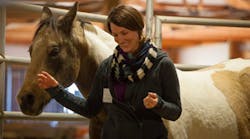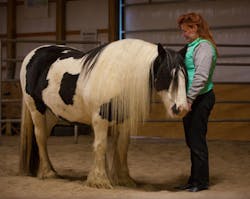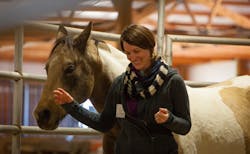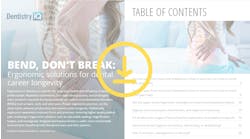Dentists and horses: A strategic partnership that can make a huge difference in your stressful life
This dentist suffered emotionally and physically from the stress of her job. Her journey to health and a healthy practice was not much different than that of many of her peers. But, it did include horses. She wants to share what she learned with her fellow dentists. Read on...
This article first appeared in DE's Expert Tips & Tricks. To receive enlightening and helpful practice management articles in this e-newsletter twice a month, visit dentistryiq.com/subscribe.
The dentist’s dilemma
Dentists entered a healing profession that demands high standards of technical expertise, for which we spent years training. Then we discovered that training wasn’t enough to be successful. We also must be team leaders, business managers, marketers, counsellors, debt collectors, and much more. As a result, even though many of us are exceptional clinicians, technologists, surgeons, and more, we struggle with the business of being exceptional practice managers.
There are many reasons for this. Some are skills-based and other reasons are more fundamental, such as typology or personality type, habitual group dynamics learned from as far back as childhood, or a lack of emotional intelligence. These can be the result of overly focusing on skills and academics, or because stress and burnout force us to disconnect emotionally from our patients and practice in order to survive.
As the market evolves, many businesses—from one-person endeavors to large multinationals—are acknowledging the need for, and bottom line impact of, more authentic and heart-centered leadership. Management and leadership journals tout the improved team morale, reduced turnover, increased productivity, and competitive edge that result from emotionally intelligent leadership. There is no shortage of coverage on the subject. What they don’t always address is the impact on the leaders themselves.
Practice management aside, dentistry is unique in that it requires highly developed technical and analytical skills, as well as empathy, compassion, and patient focus. Compassion fatigue as a result of chronic stress are occupational hazards for those of us in the healing professions. Unlike many healing professionals, however, dentists also spend the majority of patient interactions enmeshed in people’s energetic fields, physically and energetically bombarded with bacteria, fear, hate, and anxiety. It’s a cocktail of somatic input that has an impact.
With our immune systems on constant alert and our emotional defenses up to handle the constant strain, it’s no wonder we all have colleagues who are struggling with relationship tensions, physical conditions, anxiety, depression, and even suicidal tendencies. Ironically we, who are perfectionists and very good at having compassion for others, seldom turn that compassion inward, even when it affects our practice management and lives.
I was one of those colleagues. In spite of a successful practice, I found myself worn down to the point where I knew there had to be a better way. Investing in personal development, specifically coaching, was a lifesaver for me. In addition to growing my leadership skills, I also learned the essential art of self-compassion. Ultimately I regained my health and my practice. That’s what all those leadership and business journals don’t tell you: that whatever bottom line impact your expanded EQ(1) has on your practice, the impact on your life is exponential to that.
RELATED ARTICLES:This dental office manager really needs help managing her stress
Down with stress! How to be happier in your dental practice
Career satisfaction survey: Coping with stress
Coaching is an essential and multi-purpose instrument on the contemporary dentist’s tray. The right coach can be incisive, soothing, and illuminating. They can be the mirror you need to see behind the veneer of your oh-so-perfect-looking practice or life. I benefited greatly from being coached and mentored by Dr. Bob Frazer, an authority in strategic planning and management in dentistry today. I'm now passionate about passing that gift forward by coaching others who might be struggling.
What was different about my journey
But my most unforgettable coach, the guide who showed me tenderness, warmth, empathy, and how to truly be me was, and still is, a horse. The mere presence of a horse is physiologically and emotionally beneficial to humans. With a heart more than 10 times the size of ours, horses project an electromagnetic field five times larger and significantly stronger than that of humans.
Their heart rate rhythm is also what’s known in research circles as “coherent,” and it can can influence ours when it’s nearby. As a result, people interacting with horses have demonstrated measurable responses, including “lowered blood pressure and heart rate, increased levels of beta-endorphins, decreased stress levels, reduced feelings of anger, hostility, tension and anxiety, and increased feelings of empowerment, trust, patience and self-efficacy.”(2)
Horses can help us find our way when the path is unclear. They see into places deep within us, and their hearts reach places inside us that we may not know how to access. Horses don’t judge us. They simply accept and receive what we have to share, and their responses offer us an opportunity to become aware of the unconscious belief systems and old programming that may drive our behaviors. They teach us to be fully present in the moment and in our bodies, and they are unequivocal when it comes to helping us recognize when we’re being incongruent or inauthentic.
Horses show us what it is to truly lead and trust implicitly in that leadership. Their presence is powerful, and they don’t play our human mind games. When you’re working with a 1,200-pound athlete/empath as a coach, you reconnect with who you really are. You'll find that this interaction will help you effectively lead your team, serve your patients, and take care of yourself. It’s an experience that can impact you far deeper than you ever imagined, and carry you further than you have ever dared to dream. It’s a lesson you’re not likely to forget any time soon.
I suggest you visit braveheartequinecoaching.com. If the idea and philosophies appeal to you, find out if there are stables anywhere in your area. It could make a huge and positive difference in your life.
Bethany Piziks, DDS, is an equine-partnered life coach, retired dentist, and triathlete. After 20 years in practice, she left clinical dentistry, became certified in the Equine Gestalt Coaching Method®, and founded Brave Heart Equine Coaching, LLC. Bethany and her horses restore the hearts and spirits of dentists and their teams.
REFERENCES
1. Emotional Quotient – a measure of emotional intelligence, as opposed to IQ, or Intelligence Quotient, which is purely cerebral.
2. According to the preliminary research project "Horses and Humans Energetics: The study of Heart Rate Variability (HRV) between horses and Humans" conducted by Alliant International University Professor Ellen Gehrke and the Institute of HeartMath.










